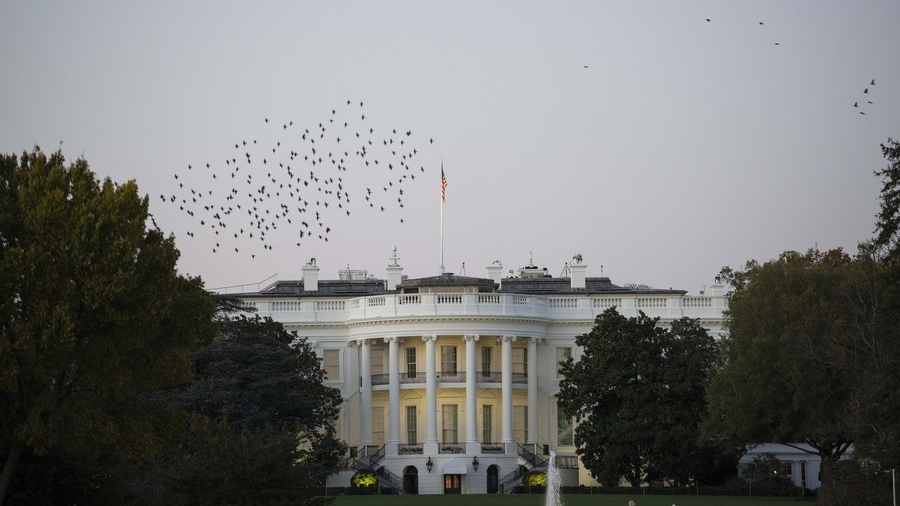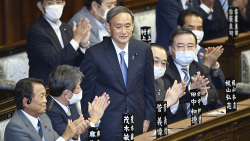
The White House in Washington, D.C., U.S., November 2, 2020. /Xinhua
The White House in Washington, D.C., U.S., November 2, 2020. /Xinhua
Editor's note: Keith Lamb is a University of Oxford graduate with an MSc degree in Contemporary Chinese Studies. His primary research interests are China's international relations and "socialism with Chinese characteristics." The article reflects the author's opinions and not necessarily the views of CGTN.
Much has been made of the fact that Joe Biden's first in-person meeting with another foreign leader is Japan's Prime Minister Yoshihide Suga. It has been lauded as highlighting Biden's willingness to prevent China's rise.
While much is made of their mutual alliance, it's worth noting that U.S.-Japanese cooperation was forged out of Japan's defeat in the World War II where the U.S. took the side of the Soviet Union and China. Of course, it came at the expense of the dropping of two atomic bombs which many scholars believe was an unnecessary move.
Maybe some feel this history means little today but in fact, there are common strategic patterns that emerge. Firstly, Japan as a non-European power was never going to be given entrance into the club of colonizers. While not defending colonialism, the principle was laid down that no power outside the Western orbit would be allowed equality.
Secondly, clearly, the U.S. conducts its foreign policy based on promoting its hegemony at any cost. This became clear not only with the dropping of two atomic bombs but also with the U.S.' turn against China and Russia, once their usefulness in fighting fascism had diminished.
The same principle of not allowing independent growth outside of the Western sphere continues to this day with China. China can adopt market-led growth and as long as it produces low-grade products everything is basically fine. However, should China seek to rise above this status, just like Japan, it will be targeted by the U.S.
Biden and Suga talked about how a free and fair economic order unites their countries. However, those who remember the 1980s will remember how Japan's growth led to consternation in the U.S. and the eventuality of confrontations was openly talked up in the press.

Japan's Yoshihide Suga stands up after being chosen as new prime minister at the Lower House of Parliament in Tokyo, Japan, September 16, 2020. /CFP
Japan's Yoshihide Suga stands up after being chosen as new prime minister at the Lower House of Parliament in Tokyo, Japan, September 16, 2020. /CFP
The 1985 Plaza Accord, which depreciated the U.S. dollar in relation to the Japanese yen, dealt has been argued was detrimental to Japan's development. Japan will no doubt then be keenly conscious that it will always be designated as an inferior nation where talk of principled economic relationships is in fact just part of diplomatic etiquette.
Within Biden and Suga's talks, they focused on preventing the rise of China the next East Asian "upstart" to seek equality with the U.S. To this end, Japan resolved to bolster its own national defense capabilities which with Japan's history of occupying East Asian states will be a worry to all.
Considering that China is Japan's largest export destination, the Sino-Japanese relationship is hardly catastrophic. Certainly, China's rise will continue to provide increased opportunities for Japan and the signing of the Regional Comprehensive Economic Partnership (RCEP) proves that both countries seek closer ties. Simply put, war is not in the interest of Japan or China.
As such, who knows what is going on in the Japanese unconsciousness when they are asked by the U.S., a country which flattened Japan's military and economic development, to join in to counter China whose economy provides Japan with so many benefits.
Perhaps, deep down the Japanese are only too aware of Biden's double speak contained within his after-meeting speech. Here, he said without a hint of irony that, "we respect sovereignty and territorial integrity and are committed to peacefully resolving disputes and to opposing coercion."
Clearly, Vietnam and Iraq, to mention just two, don't count in the U.S.' consciousness as imperial exploits. The fact that, Japan has "hosted" U.S. troops since its defeat in the World War II points to a reality where there is a fine line between invitation and occupation when it comes to power. This distinction was recently displayed by Iraq's requests for a U.S. withdrawal, which was politely rebuffed.
Japan's increasing military spending can be seen as not just acting in opposition to China but as a hedge against U.S. hard power hosted in Japan. Should the U.S. once again decide that Japan's development needs clipping then Japan's military growth can be used as a bargaining chip in any attempt at a future Plaza Accord.
In addition to the economic and military contradictions of the U.S.-Japan relationship, both sides gushed about shared environmental values, decarbonization, and the advancement of clean technology, "especially in developing countries" in the Indo-Pacific. However, these statements are clearly worthless when Japan, with the acquiescence of the U.S., gears up to dump radioactive water into the Pacific.
This potential catastrophe is naturally opposed by East Asian states who feel it harms their environmental security. Thus, the principle of the U.S. and Japan working together to maintain East Asian security is merely, as the Japanese are no doubt acutely aware, double-speak for maintaining U.S. hegemony.
(If you want to contribute and have specific expertise, please contact us at opinions@cgtn.com.)

